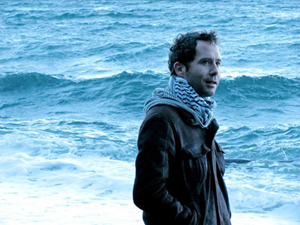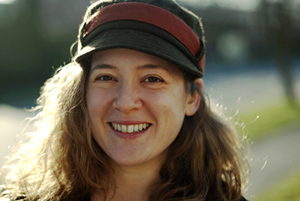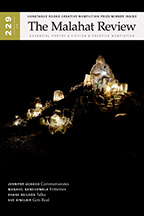Into the Dark Vortex of Time :
Andrea Routley in Conversation with Trevor Corkum

Malahat volunteer Andrea Routley talks with Trevor Corkum, whose story, "You Were Loved" (issue #177, Winter 2011) was nomiated for the 2012 Writers' Trust / McClelland & Stewart Journey Prize.
Congratulations on being nominated for the 2012 Journey Prize for your story "You Were Loved"! What has that been like?
Thanks, Andrea. It’s been exciting to become part of the long list of CanLit heroes to grace the JP pages. I discovered some of my favourite writers – people like Yann Martel, Charlotte Gill, Lee Henderson, Neil Smith – through reading previous versions of the Journey Prize Stories . This year’s collection is packed with lots of great work. It’s an honour to be included among the likes of Andrew Hood, Kris Bertin, and others.
One of the things I loved about this story was the macro-cosmic sense of time you create with your descriptions. How awesome to attach the images of a medieval serfdom, road-kill soup, and a Commodore 64 to the same childhood place! "You Were Loved" plays with this concept of time in other ways, too. Can you tell us about this? Is "time" something you often play with in your fiction?
Bouncing around in time is a big part of a lot of my work, or more accurately, trying to reflect our experience with time and memory. Some of my early influences were people like Alice Munro, who look closely at the ways in which we are in constant dialogue with our past, re-interpreting significant events and memories at various stages so the memories themselves become stories of stories, mediated versions. Munro is a master at illustrating how we live simultaneously in many moments of time – childhood, early adulthood, last year, this morning – all might be called forth within a few minutes of sitting with a coffee and looking out the window. “You Were Loved” is told from the point of view of a much older Elliott, looking back on a terrible night in early adulthood from far off in the future. I think a lot about how the “stuff” of our past – the physical relics and detritus – can be the trigger to reach deeper into the dark vortex of time, for better or for worse.
This story also explores ideas of alienation from self, such as the mother's (perceived) self-conscious imitations of movie-moments, and of course the protagonist's sexual encounter. This is something I relate to, and a theme that comes up often in writing by queer authors in particular. Would you like to speak to that?
It’s interesting that you frame the question this way. I think for many people in general, queer or straight, intimacy and sex can be a difficult, complicated terrain, the place we experience deep emotions – pleasure, terror, liberation, possibility. There’s often, especially in our early adult lives, a strong element of performance in sex, recreating what we believe or how we imagine things should be, based on what we’ve seen and learned. There’s a struggle to get to the core of intimacy, to overcome that performance element and connect in an authentic, truthful way. The queer experience of intimacy can be fraught because of the rejection and alienation many queer people feel in their youth. So the potential for pleasure/acceptance and exploitation/rejection are heightened; the stakes can be raised. In “You Were Loved,” I also wanted to explore how that sense of shame or trauma around sex and intimacy can be passed down through generations; how pain can beget more pain.
"You Were Loved" is sexually explicit, and includes gay anal sex. Do you feel any reservations when submitting this type of content?
Not a lot. I’ve worked with many editors in Canadian magazines who have been supportive of my work and the themes explored. The truth is that in general there’s a dearth of honest writing about sex generally in CanLit, so it’s an area that’s ripe for exploration. “You Were Loved” is very much a story about intimacy and sex, so it would be impossible to tell the story truthfully without being specific and accurate in the sexual details. I am grateful to early readers, as well as John Barton’s keen editorial guidance, for pushing me and the story to be honest.
Do you notice any patterns in your writing -- are there themes you come back to?
Childhood is a big one. I think many of us are in a kind of ongoing conversation with our earlier selves, and most of our neuroses and habits and fears stem from our experiences in childhood. I’m interested in examining through my characters and their lives some of the moments that begin to set the stage for later life events, to understand the coping patterns and habits that get laid down, that shape how characters will respond in a given situation. I tend to be drawn to darker material, to characters who drift and stumble into fleeting half-revelations about themselves and the world. Passion, the possibility of grace, the urge for freedom, the open road – these all figure prominently in my work.
How many publications did you submit this story to before it was selected by The Malahat Review?
I sent a few very early incarnations of the story around, and fortunately these early versions were kindly turned back at the door. Each time the rejections came back with polite feedback and concrete suggestions for improvement. What I found, in these early versions, is that I was holding back on diving down into the dark heart of the story, dancing around the edge. This early encouragement helped me get closer to the emotional truth of the story. It took some time to get it right.
Why do you think the judges picked your story?
You’ll have to ask the judges.
Darn. Writers are so modest. So what's next?!
I’m just polishing off a collection of short stories (my thesis from UBC’s optional residency MFA program) that I’m getting ready to share. “You Were Loved” is part of another, newer collection of linked stories that follow Elliott in the years following the night we meet him in the story. I’m also doing early research for a novel set at the turn of the millennium in Halifax. That’s a big project for the next year.

Andrea Routley
* * * * * * * *









